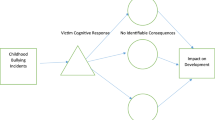Abstract
A variety of changes in Peace Corps Volunteers (PCVs), 43 men and 34 women, are reported. Analyses were based on assessments made before and after an overseas tour of duty for political status, self and ideal-self constructions, perceptions of parents' child-rearing techniques, and moral reasoning. Comparisons with several samples of students and activists, studied earlier, indicated that initially the PCVs were a middle group politically, rather conventional personally, and family entrenched, the women more than the men. Evidence of their various but unitary shifts to political liberalization, greater intraceptiveness and self-determination, greater detachment from their parents, and increased incidence of principled moral reasoning suggests that the PCVs had undergone substantial self-redefinition.
Similar content being viewed by others
References
Block, J. H. (1965). The Child Rearing Practices Report. Institute of Human Development, University of California, Berkeley (mimeo).
Block, J. H., Haan, N., and Smith, M. B. (1969). Socialization correlates of student activism.J. Soc. Issues 25, (4): 143–177.
Cotton, J. W. (1973). Par for the Corps: A review of the literature on selection, training, and performance of Peace Corps volunteers (in press).
Haan, N. (1971). Moral redefinition in families as the critical aspect of the generation gap.Youth Society 2(3): 259–283.
Haan, N. (1974). Hypothetical and actual moral reasoning in a situation of civil disobedience.J. Personal. Soc. Psychol. (submitted).
Hann, N., Smith, M. B., and Block, J. H. (1968). The moral reasoning of young adults: Political-social behavior, family background, and personality correlates.J. Personal. Soc. Psychol. 10: 183–201.
Harris, J. G. (1973). A science of the South Pacific: An analysis of the character structure of the Peace Corps volunteer.Am. Psychologist, 28(3): 232–247.
Kohlberg, L. (1969). A cognitive-developmental approach to socialization. In Goslin, D. (ed.),Handbook of Socialization, Rand McNally, New York.
Kohlberg, L., and Kramer, R. (1969). Continuities and discontinuities in childhood and adult moral development.Hum. Develop. 12: 93–120.
Sanborn, K. O. (1964). Where are they now: Deselected and resigned trainees' present circumstances. Unpublished paper, University of Hawaii.
Smith, M. B. (1964). Peace Corps Teachers in Ghana. Final report of evaluation of Peace Corps Contract No. PC-(W)-55, September.
Smith, M. B., Haan, N., and Block, J. H. (1970). Social-psychological aspects of student activism.Youth Society 1: 261–288.
Stein, M. F. (1966).Volunteers for Peace: The First Group of Peace Corps Volunteers in a Rural Community Development Program in Colombia, South America, Wiley, New York.
Turiel, E. (1974). Conflict and transition in adolescent moral development.Child Develop. (in press).
Author information
Authors and Affiliations
Additional information
Received Ph.D. from California School of Professional Psychology, 1974. Interests lie in the areas of adolescent development, moral development, ego functioning, and political psychology.
Rights and permissions
About this article
Cite this article
Haan, N. Changes in young adults after peace corps experiences: Political-social views, moral reasoning, and perceptions of self and parents. J Youth Adolescence 3, 177–194 (1974). https://doi.org/10.1007/BF02214748
Received:
Issue Date:
DOI: https://doi.org/10.1007/BF02214748




